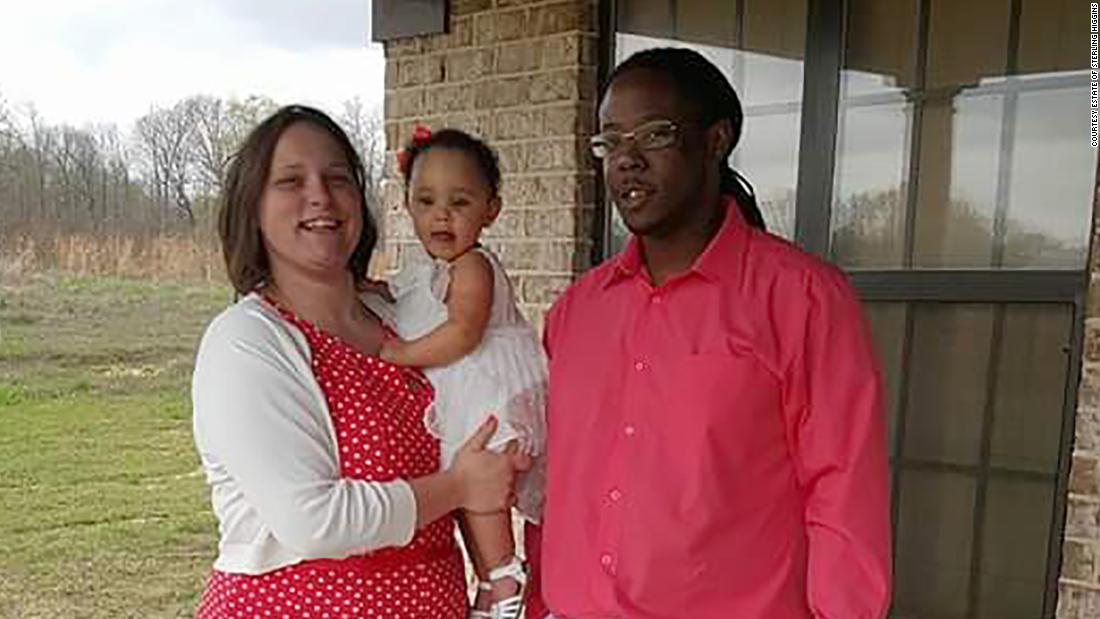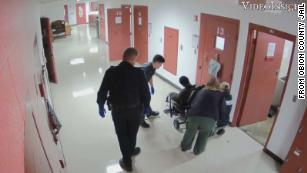CNN has reported on a case being handled by Budge & Heipt involving the death of a man named Sterling Higgins in a Tennessee Jail. The piece, which aired on June 12, 2020 during Cuomo Prime Time, can be viewed here:
Online reporting from CNN, also on June 12, 2020, can be read here.
From CNN, June 12, 2020:
—————————————————————————
Videos raise question about in-custody death deemed an ‘accident’ by Tennessee officials

(CNN) Within hours of his call to 911 outside a convenience store, Sterling Higgins lay dead, after video shows him being forcibly restrained on the floor at the Obion County Jail in Union City, Tennessee.
A surveillance camera video from that morning, 15 months ago, shows a correctional officer gripping Higgins’ neck and head for nearly six minutes, and part of that time his arresting officer with one foot on him. Then, Higgins’ limp body was dragged to a restraint chair and wheeled into a cell.
The video, submitted in a wrongful death lawsuit filed in federal district court in Tennessee, is at the heart of another claim that yet another black man needlessly died in custody because of law enforcement misconduct. All the defendants have denied the allegations in legal filings.
 Sterling Higgins
Sterling HigginsThose videos were never shown to a grand jury that, last October, declined to indict any of the officers involved, as first reported by WSPD, in Paducah, Kentucky. The 27th District attorney general, Tommy Thomas, told CNN he didn’t see the need to show jurors the video because he already had decided not to seek criminal charges against the officers.
He said that while he doesn’t believe the officers handled the situation correctly, “that’s a long way from being criminally responsible for a homicide.”
Edwin Budge, a Seattle-based attorney representing Higgins’ estate, said the videos are crucial evidence and that the grand jury “should have been provided with those facts; and now it’s our job as civil attorneys to bring these facts to light.”
Higgins’s death raises questions not only about the events of that night, and the officers’ use of force, but also about police training and practices in how to handle people behaving bizarrely or who seem to be mentally distressed.
Nathan Tilly, the attorney representing the three corrections officers named in the suit, declined comment, other than to say, “we’ve denied the allegations.” John Burleson, the attorney representing the arresting officer, Robert Orsborne, declined comment. In court filings, Orsborne denied causing Higgins’ death. All the officers claimed qualified immunity, a doctrine that holds officers immune from personal liability for acts done in their official capacity unless they violated a clearly established law or constitutional right. The city and county also denied wrongdoing.
According to Union City police records, Higgins, 37, called 911 from the parking lot of Pocket’s Market, a convenience store. He told police that someone was following him, trying to kill him and steal his money. According to the complaint, one of the officers “suggested to Mr. Higgins that he probably needed to go to a hospital,” based on how he was behaving. Attorneys for the defendants denied this allegation. He agreed to leave.
 Officers place Sterling Higgins into a restraint chair in the Obion County Jail in Union City, Tennessee.
Officers place Sterling Higgins into a restraint chair in the Obion County Jail in Union City, Tennessee.But officers soon returned, after another 911 call, to find him hiding inside a cooler at the back of the convenience store. They arrested Higgins for trespass.
Based on his erratic behavior, the complaint alleges, police should have realized Higgins was suffering from a medical or mental-health crisis and taken him to a hospital or mental health facility. According to records, Higgins’ estranged wife told investigators that “he was diagnosed with paranoid schizophrenia but refused to take the medication prescribed to him.” Budge said he couldn’t comment on Higgins’ mental health because he hasn’t yet seen the underlying medical records.
Union City Police Chief Perry Barfield said his department’s policy is that “if someone has a medical condition that warrants going to hospital, then they would transport them there first, but there’s nothing in place regarding mental-health issues.”
Instead, officers took him to the Obion County Jail. Surveillance video at the jail shows Higgins, handcuffed, running around the police car. Taken inside, he briefly grabbed the hair of a female corrections officer, before being taken to the floor by Orsborne, then held on the floor by officer Waylon Spaulding.
In a handwritten statement, Spaulding said Higgins tried to spit at him, so “I … put my hand under inmate Higgins’ chin in an attempt to keep him from spitting on any other officers.”
As Spaulding gripped Higgins’ throat and face, two other jailers put shackles on his feet and legs. While the video is unclear, the arresting police officer, Orsborne, told investigators he put a foot on Higgins’ leg, then stood on the leg shackles’ chains to help restrain him.
 Sterling Higgins with his daughter
Sterling Higgins with his daughterThe video shows Spaulding holding the grip on Higgins’ neck, and Orsborne standing over him, for several minutes. Higgins’ body goes limp, but Spaulding maintains the pressure for another two minutes, according to the lawsuit. By the time he removes his hands, it has been nearly six minutes in total.
At about 1:55 a.m., the jailers drag Higgins’ limp form to a restraint chair, the video shows. They wheel him into holding cell 15. A few minutes later, they check him. Spaulding, in his handwritten statement, said Higgins wasn’t breathing, so they called emergency medical services. EMS records show they received a call at 2:06 a.m.
At 2:15 a.m., an EMS team arrived. Higgins had no pulse and wasn’t breathing, according to the EMS report, which described his “primary symptom” as “obvious death.” The team performed CPR. He was declared dead at a local hospital at 2:52 a.m.
In his autopsy report, pathologist Marco Ross noted a small hemorrhage on a muscle on the left side of Higgins’ neck. “He stated the finding did not mean that Higgins was choked or strangled. The injury is common and not fatal,” said an investigator’s report. Ross concluded Higgins’ “death was caused by excited delirium due to methamphetamine toxicity,” and termed it “an accident.”
Budge said an independent medical examiner is reviewing the findings, as part of the suit, “and the full facts will come out.”
Higgins’ post-mortem showed 620 nanograms per milliliter of methamphetamine in his blood. A footnote in the autopsy report stated that “blood levels of 200-600 ng/mL have been reported in methamphetamine abusers who exhibited violent and irrational behavior.”
Tommy Thomas, the district attorney general, told CNN that as soon as he found out about the death, he called the Tennessee Bureau of Investigation to do an independent investigation. But based on the autopsy findings “and other investigative work done by the TBI, it was my determination that there was no criminal liability here,” he said.
Thomas also said he told Higgins’ family “that there is a much lower standard in a civil responsibility case. Then I recommended that they seek counsel and perhaps proceed with a civil lawsuit. And that’s what the family has done.”
 Sterling Higgins with his daughter and her mother, Jennifer Jenkins, the administrator of Higgins’ estate.
Sterling Higgins with his daughter and her mother, Jennifer Jenkins, the administrator of Higgins’ estate.Thomas added that he refers all deaths in custody to a grand jury, as he did this one, as a matter of policy. But, “in this case, I did not believe beyond a reasonable doubt that any of those officers were guilty of a crime.” Typically, grand juries issue indictments when there is probable cause to believe a crime was committed; the reasonable doubt standard is used by trial juries deciding whether to convict.
To Budge, the key issue is that Higgins didn’t need to die.
“I think that there are multiple points in time where Mr. Higgins’ life could have been saved,” he said.
He questioned why Higgins needed to be arrested in the first place, rather than being referred for medical or mental-health care. He questioned why, once Higgins arrived at the jail, Spaulding apparently maintained pressure on Higgins’ neck for so long.
The jail’s use-of-force policy states that “the amount of force applied shall only be as much as is reasonable and necessary to control a given situation.”
“Officers have a way to deal with people who are alleged to be spitting. There was a spit mask available to the officers. Apparently, they never applied it,” Budge said. “And it certainly doesn’t explain why an officer would keep his hands around somebody’s neck or throat area for fully two additional minutes from the point that the person stops moving.”
Then, too, he said, “the fact that medical was not called immediately after he became limp and nonresponsive raises great questions.”
There are also questions about the conclusion that Higgins died from “excited delirium.”
According to the National Institutes of Health, excited delirium “is not a currently recognized medical or psychiatric diagnosis,” in either the diagnostic manual of the American Psychiatric Association or the international classification of diseases of the World Health Organization.
One medical examiner, who spoke on condition of not being named because he wasn’t involved in the Higgins case, said that coroners sometimes the term “excited delirium” when there were multiple factors and they’re not really sure just what caused the death. He said, “a lot of people don’t use that term anymore,” and that often, it’s more useful simply to list all the contributing factors individually.
Budge also questioned the finding of “excited delirium.”
“Ultimately, the end goal is to get to the truth and get justice for Sterling Higgins,” he said, and “that change is made so that people’s lives are protected because nobody, nobody should be in the position of dying in jail when that death is preventable.”
In a statement, Jennifer Jenkins, administrator of Higgins’ estate, said, “Sterling Higgins was a good man who deserved fair and humane treatment. He left behind two young children, who will now grow up without a father. He was treated as if his life doesn’t matter. We want the truth to be known. We want accountability. We want justice or Sterling Higgins.”


